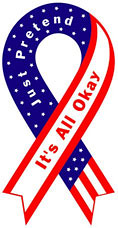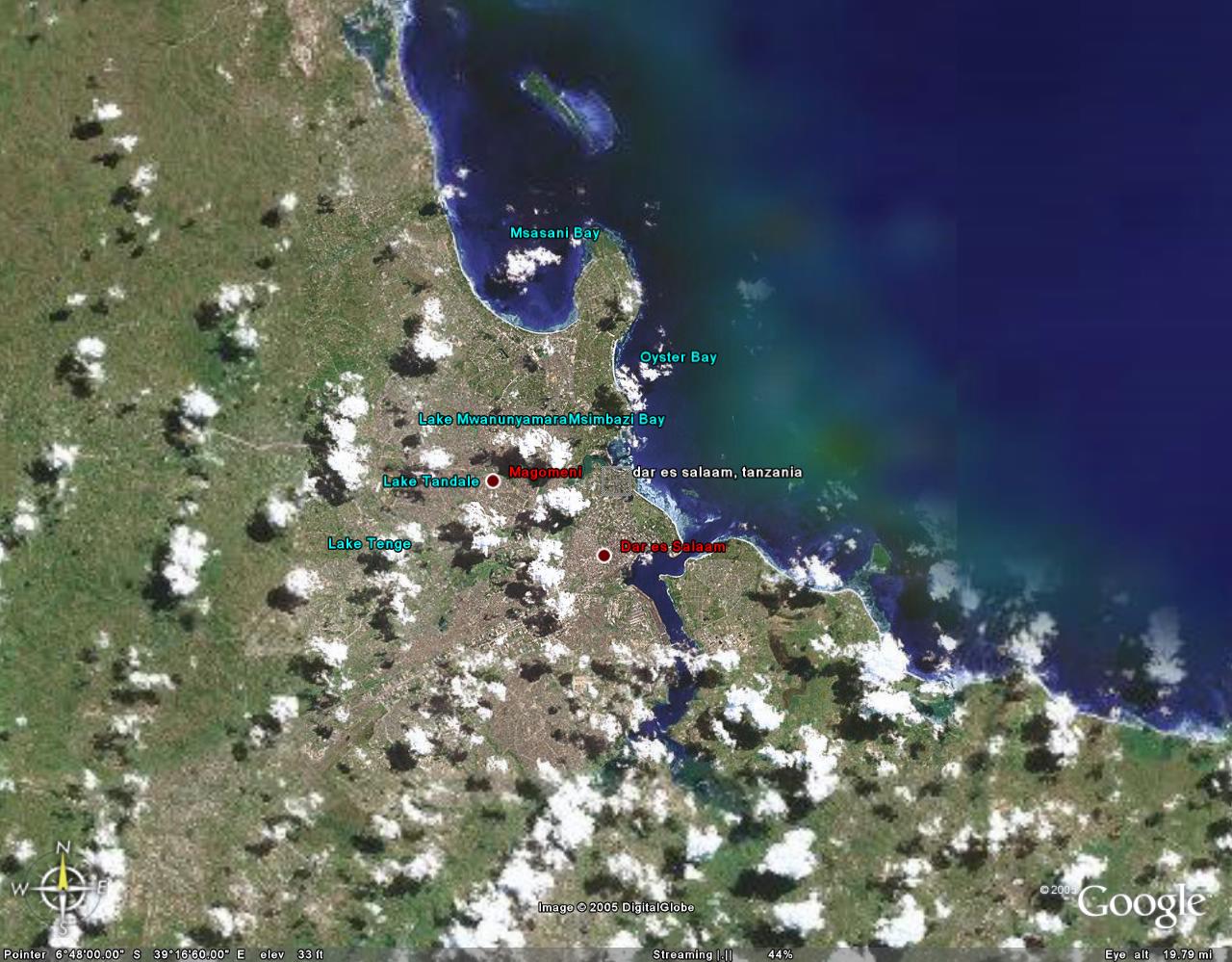
dar es salaam tanzania.
yes... i know this is obnoxiously large-
you can't appreciate what's happening if i posted it any smaller.
you wouldn't be able to appreciate that i'm a google earth junky.
i couldn't resist. i'm completely and utterly obessed w/ google earth.
i basically heart it.
you should try it b/c i believe you will like it too.
it will baffle and astound you.
i have little to no idea how to work it all- but i've stayed up till 2am every night since i installed it looking and lurking around the world.
in other news- i've managed to kill my vegetable garden.
japanesse beatles have consumed my beans. little bastards.
all that remains is my tomato plant and dill.
it takes a lot to kill dill.
today's chewable vitamin
"forever is composed of nows."
~ emily dickerson
2005-07-29
2005-07-27
o.k. people...
i just saw the lead singer from loverboy.
the best part?
he works in the warehouse where i work.
don't be jealous.
it's unbecoming.
by maureen at 7/27/2005 0 shout outs
2005-07-25
from the visit...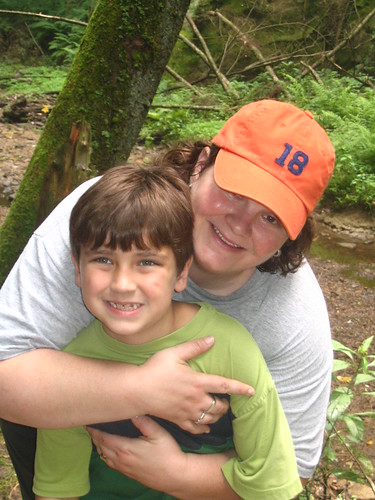
this is me and a. love the pensive smile from a.
so funny how you learn to pose for photos...
m on slip n slide
j enjoying himself...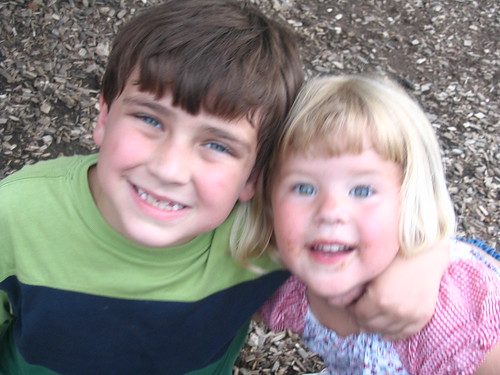
cousins- look at those eyes.
this is one of my favs...
today's chewable vitamin
"if a free society cannot help the many who are poor,
it cannot save the few who are rich."
~ john f. kennedy
tag: family
by maureen at 7/25/2005 0 shout outs
2005-07-21
the sudan
the hunger season in sudan soon approaches.
does the u.s. government support democracy or only when it suits us?
is your investment money helping support
the genocidal sudanese government?
to find out go here, or here...
today's chewable vitamin
"now, for all its failings and its perversions over the last 2,000 years—and as much as every exponent of this faith has attempted to dodge this idea—it is unarguably the central tenet of Christianity: that everybody is equal in God's eyes. so you cannot, as a Christian, walk away from africa...
what's up on trial here is Christianity itself. you cannot walk away from this and call yourself a Christian and sit in power. distance does not decide who is your brother and who is not. the church is going to have to become the conscience of the free market if it's to have any meaning in this world—and stop being its apologist."
~ bono
by maureen at 7/21/2005 0 shout outs
2005-07-19
the one where maureen learned to drive a landrover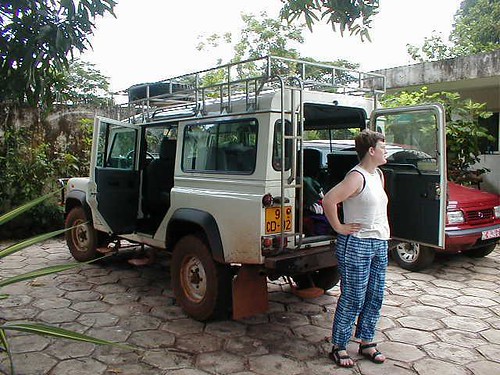
this is just like the ones we drove. same era.
and no... i don't know that girl.
this is a post about when i learned how to drive a land rover defender near the serbian border and how it totally kicked ass.
these are just some of the things we learned how to do in landrovers.
crossing river beds and shit...
and this...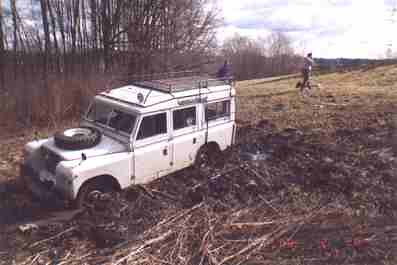
we navigated through 'roads' like this...
civil engineering in many communist eastern europe country's was desgined to isolate people. hairpin turns up steep mountain ranges are still standard fair... our training was supposed to prepare us to take teams of eight into remote villiages tucked away in the albanian alps to do JESUS film showings.
our training took place over a weekend and involved making all these obstacles in river beds and using the diferential and stopping and starting on steep hills. our pit stops included stopping in pastuers that were carpeted by wildflowers. it was incredible.
we also slept in a chicken coop. we eventaully converted it to make it livable to 200 americans. that's a whole nother story.
basically, i felt like a total bad ass the whole time. it was awesome.
addendum...
and we learned how to top off fluids and change tires.
by maureen at 7/19/2005 0 shout outs
2005-07-18
randomly...
in the news of my life lately-
- i went to the hocking hills w/ my family on thursday. it was pretty great.
- took my husband to the e.r. last week for chest pain(!!!!!) turns out it's chest wall pain. not serious but seriously hurts. he is on the mend.
- pictures coming soon of my time w/ the posse at old man's cave.
- nephew jack found a patch of gray hair on my head. nice.
- charles got a job, w/ benefits in his field. we're both thrilled!
- i have a black afro wig in the trunk of the fox. i thought you should know.
side bar on the nashville sully's visit to columbus...
nora who will be two very soon is very funny. she calls my brother (her father) by his first name. she babbles lots but her most understandable language is your name. she will learn it. then she will yell it to get your attention. but the funny thing is, that the calling tone eerily like a mother to her kid. she also whispers. this makes me melt.
jack and i walked through conkle's hollow together. we were talking about making art for some reason. i told him about the 'studio' charles helped me establish in our basement. jack inquired here and there about my art making; invited himself over to make some stuff together; then asked why i do it.
i said, 'well- you know how you pray to God and it helps to feel close to Him?' he looked up, and nodded yes. i said, 'well- maybe this sounds weird- but when i get into making art, it can be like prayer for me.' jack stopped, looked at me, and said, 'that doesn't sound wierd at all.'
aidan is eight and is the sweetest boy. he's easy to be around and i really adore him. the only funny thing i can think to say is that he starts many conversations w/ the following phrase, 'ladies and gentlemen, boys and girls...!' this is his lead into a legos episode that he has scripted. it has rubbed off on maggie as well. which is hilarious- b/c the last thing maggie needs is more drama in her life (see below).
quote of the week:
context:
maggie, my three year old OPINIONATED niece being verbally corrected by my sister in law for screaming in restaurant:
'mommy, i can't be quiet. it will hurt my body.'
(note: 'body' could be substituted for 'mind', or 'heart' as well)
classic. the funny thing? i totally understand.
this isn't communicating the way i'd like. alas- the limits of the internet. some of the funniest material looses its edge and context. oh well.
by maureen at 7/18/2005 0 shout outs
2005-07-13
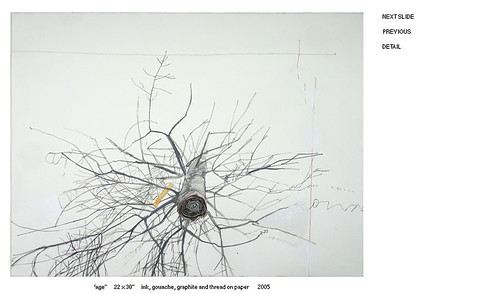
i love love love this image.
i got it here.
markings...
today is my 14th birthday as a christian and a sober member of society.
i have done a lot of growing up over the last fourteen years.
i still have lots of growing up to do.
i get bummed sometimes at the slowness of the process in me.
i have periods of time and clarity when i snap out of it and realize that life is not a series of pleasurable events that is only interrupted by blissfully deep emotional connection w/ humankind.
life can be really hard.
but my life today is better than i ever would of imagined.
and the beauty? it has so very little to do w/ me.
here’s to many more years of saying yes to the Lord in more and more ways and areas of my life!
today's chewable vitamin:
"your persistent longing is your persistent voice.
but when love grows cold, the heart grows silent.
burning love is the outcry of the heart!
if you are filled with longing all the time,
you will keep crying out, and if your love perseveres,
your cry will be heard without fail."
~ augustine
by maureen at 7/13/2005 0 shout outs
2005-07-11
photo montage...
look- i'll admit it. i'm in love.
i'm mad about my nieces and nephews.
infact, to show you how mad i am about them- i want to tell on myself.
we have a archaic answer machine.
on my birthday (in may) i received two messages from my brother's kids who sang two songs on two seperate messages to me. i've managed to keep them. i play them whenever i'm sad or need a pick me up. it works like a charm.
everyone will be in town soon- and i can't wait.
it will be welcomed and beloved mayhem!
we will have sleep overs, bikerides, swimming, reading and playing in the creek in my mom's ravine. it will be wonderful. for now- i will post some pictures.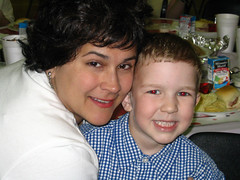
this is andrea and j. i think my sister in law is such a babe.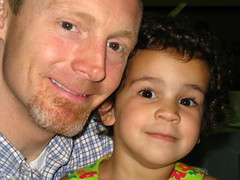
this is matt and m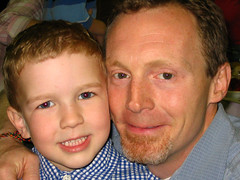
this is matt and j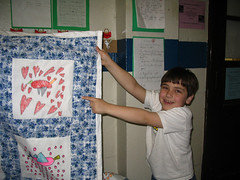
this is a w/ his tsunami survivors quilt he and his class made.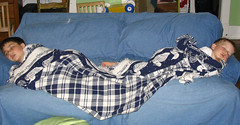
this is a and j. they are best buddies.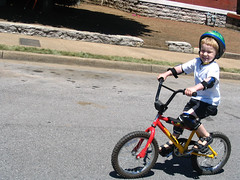
this is j riding his bike
by maureen at 7/11/2005 1 shout outs
2005-07-08
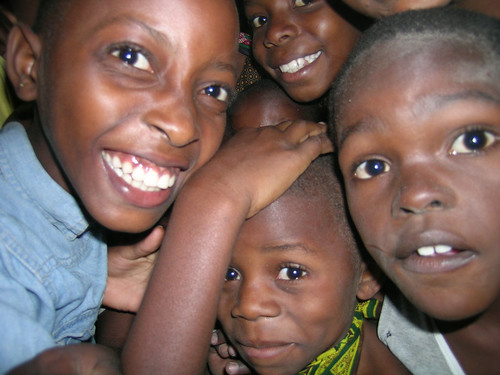
this is taken from the kinnell's blog while they are in tanzania.
read them here...
happy last day of the g8 to you and yours!
(i'm submitting that to hallmark.)
here's some coverage that you might like to read...
the economist's take (a good overview)
rueter's coverage
one case for the skeptic
brookings fellow reviews 'reality' of aid to africa.
today's chewable vitamin
"a true revolution of values will soon cause us to question the fairness and justice of many of our past and present policies. a revolution of values will soon look uneasily on the glaring contrast between poverty and wealth. with righteous indignation, it will look across the seas and see individual capitalists in the west investing huge sums of money in asia, africa, and south america only to take profits out with no concern for the social betterment of the countries, and say: 'this is not just.'"
- martin luther king jr.
by maureen at 7/08/2005 0 shout outs
2005-07-07
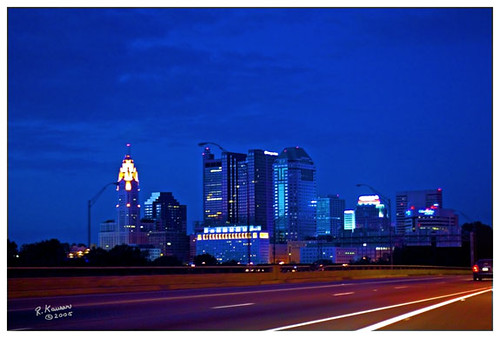
borrowed from this guy...
fun, free and forgotten
good things about columbus:
~ by maureen
well- this is an odd post i find myself writing. see- for a number of years; i've made fun of columbus. i've made fun of columbus because the truth is- i can be a haughty jerk sometimes. don't tell anybody.
so- i could comment how my beloved grandview is on the verge of being taken from local shop owners and sold to the proverbial devil of capitalist pig owned chains- but i won't. i won't b/c the truth is- i love capitalist pigs. really. don't tell anybody.
anyhoo- columbus isn't too bad actually. i think everyone goes through a 'this town sucks!' phase w/ where they grew up. especially if they've lived outside of the state of ohio. i remember; my first summer home after moving back from nyc; i worked at the ohio state fair- and i really thought i might die. i didn't die of course- but it was a warp speed transition that is not for the faint of heart.
so- my post about my favorite forgotten and free things about columbus. i’ve tried to keep them w/in the cheap to free category b/c these are factors that determine my now- this is a participatory exercise. please share your own tips. and on the slight chance that a friend from nyc is reading this- please don't steal my thunder and write about how you're going to the moma for free on thursday or how you took a picnic to bryant park for tuesday night movies. and don't you dare write about the chelsea flea market. i might throw myself against the wall.
so- now- really my post about my favorite forgotten and free things about columbus.
wosu 89.7: is a rarity in the public radio scene. i like classical music a lot. tchaikovsky, brahms, vivaldi ; chamber, coral, symphony; cantata, movement, suite. all that stuff is on there. i just looked up all that stuff on the internet to sound like i know what i’m talking about- but i don’t
the chalk festival in the short north: what made me think of this event (that happens in the autumn) is that i went to comfest a couple of weekends ago. i’m not so into the comfest anymore. too dark and too much cannibis for me. i really like the festival season in the late spring through early fall here in columbus- but the highlight for me is the chalk festival. it’s my favorite b/c it is unpretentious creativity at it’s best. it’s not all profound and shishi. it’s just fun and you should go.
inniswood gardens: this is in westerville and it is gorgeous. i have gotten into gardening the last couple years. which i’ve been told means- i’m aging or i’m a geek. or i’m a aging geek. i dunno. but i love love love this garden space.
the dollar theater: i mean- come on. i can’t write about columbus and not mention the dollar theater (it’s not actually a buck by the way- but the dollar fifity theater takes longer to say). it is a perk. especially when you’re newly married and poor. or single and poor.
restoration: this is a double edged sword. there have been some restoration projects that have gone really well and sparked commerce rather than put it w/ odds w/ preserving historic building in columbus.
it’s a double edged sword b/c it is not the most common approach in columbus to preserve/ restore a building. usually, people just tear down old structures. recently, there are a number of projects and building that have gotten new tenants and owners have put a little love into the buildings. it seems to me that the love has paid off.
the old highway patrol building is now home to the health department.
m/i homes hasn’t taken out the entire enclave of olde town east. instead it is a diverse neighborhood w/ lots of refurb homes.
the old central high school now houses cosi. i don’t have kids yet; but i loved going to cosi as a wee lass and i love to take my nephews and neices. it’s on the river front and i like that it has programs that are accessible for underserved kids too.
hawk galleries made a gusty move downtown to a redone building away from the security of the short north.
i also just want to say that i think mayor coleman has done some really good things for columbus and revitalization efforts.
i felt like i should write about the music scene in columbus. but the truth is i don’t know much about it. but it seems to be pretty easy to hear decent live music w/ a pretty good variety to boot. i’ll leave comments on that to the experts.
i know that there are a lot of other things that are cool about columbus- but these are things/ events/ places/ opportunities that seem to be fairly unique for a city our size. we seem to be on the cusp of being too big to have some of the smaller town amenities; and too small/ young to retain some of the niceties of a bigger city as well. if i missed some please feel free to add them or give feedback in the comments.
by maureen at 7/07/2005 0 shout outs
2005-07-05
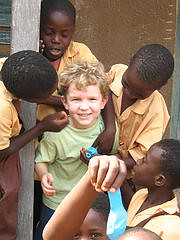
this is my nephew w/ some of his friends in ghana.
look
this is an important week.
i hope i don't get hate mail comparing me to a w.t.o. protester.
it just doesn't have to be this way.
that's all i'm sayin'.
today's chewable vitamin
the world today is suffering a new kind of injustice -
a new kind of apartheid.
you have a few people in the developed world dominating the affairs of the rest of the world.
it is sinful that in a world in which there’s been so much prosperity because of globalization that we find this divide between the super-rich
the people with a lot of resources in the developed world -
and the many people who go hungry every day.
economists tell us it doesn’t have to be like this.
~ bishop njonkulu ndungane
by maureen at 7/05/2005 0 shout outs
2005-07-04
happy 4th of july
ahhhh... freedom and what it affords.
for the record, i am grateful for my country.
i really don't think i could hack being born elsewhwere.
this is worth reading... seriously.
if you're interested in the situation in darfur;
take some time and read this:
DYING IN DARFUR
by SAMANTHA POWER
Can the ethnic cleansing in Sudan be stopped?
originally found in the new yorker.
Amina Abaker Mohammed occupies a simple mud hut with a thatched roof outside a refugee camp in northern Chad. Until earlier this year, she lived in Darfur, the western region of Sudan, where the Sudanese government is pursuing a campaign of ethnic cleansing against non-Arabs. Amina is a member of the Zaghawa tribe, one of the largest non-Arab ethnic groups in Darfur. Her village, which was burned to the ground by Sudanese soldiers and Arab militiamen, is only fifty miles from the camp, but by donkey the trip requires a weeklong journey across the Sahara, through mounds of powdery sand, up and down steep seasonal riverbeds, over gravel slopes, and around towering red-rock mountains.
Amina, who is twenty-six and Muslim, grew up in the town of El Fasher, in North Darfur. Twelve years ago, she married Haroun Adam Haggar, and moved a hundred and sixty miles north, to a farming village near the town of Furawiyah. They had six children, and made a good living growing sorghum and herding ten cows and some five hundred sheep. During my visit to northern Chad, in July, Amina told me that Arab nomads used to pass through Furawiyah with their animals, but they stopped doing so eight years ago. That was around the time that she first heard frightening stories about the janjaweed, nomadic Arab bandits who rode on horses and camels, and enriched themselves by stealing livestock and attacking Africans. (“Jaan”means “evil” in Arabic, and “jawad” means “horse”; “janjaweed” means, roughly, “evil horseman.”) The janjaweed included local camel herders, and also nomads who migrated to Darfur from Chad and West Africa in the nineteen-seventies and eighties.
During the planting-and-harvest season, from August to November, Amina’s oldest child, a ten-year-old named Mohammed Haroun, moved south with the livestock in search of grass and water. When the animals were brought back, four months later, they were ready to be sold, or used for leather, food, and milk.
In the months when Mohammed was at home, Amina recalled, she would accompany him and their animals to one of Furawiyah’s two dozen wells. Amina would straddle the well, drop the bucket to the bottom, thirty feet down, and haul up the cool water; then she would empty the bucket into a trough for the animals, or into bags made of donkey hides, for storage. Mohammed would immediately follow her, sending the bucket tumbling into the darkness and using all his strength to mimic his mother’s maneuvers.
By January this year, Amina told me, the townspeople of Furawiyah were on alert. The government was trying to crush a resistance movement that had emerged in Darfur, and it had enlisted the janjaweed as its foot soldiers. Amina’s neighborhood had been inundated with family members, tribal kin, and displaced strangers, who had been driven from their homes by a combination of janjaweed raids and government air assaults. Many of these visitors had not stayed long. They had stopped in Furawiyah for water and quickly resumed their journey to Chad. They urged Amina to do the same. “The janjaweed are nearby,” they said. “Leave while you still can.”
Amina was no stranger to tribal killings. Five years earlier, the janjaweed had attacked a village outside El Fasher and murdered Africans, including two of her uncles and four of her cousins. But Amina told herself that her town would escape the violence spreading through Darfur. Unlike many towns in the region, it was guarded by policemen, who had helped fend off cattle rustlers in the past. Other villagers were less sanguine. Government helicopters had been flying overhead for three months, and some tribal leaders insisted that the Air Force was surveying the town for bombardment. They were right: soon, a military aircraft fired four rockets, two from each wing, on Furawiyah. The attack terrified Amina; although one rocket failed to explode, the others left large craters in the ground. She and her husband refused to abandon their land, but they sent all their children, except Mohammed, to hide in the mountains.
On January 31st, Amina’s husband was away visiting his family. Not long after dawn, when Amina and Mohammed arrived at the wells, they heard the sound of approaching planes. Fifteen minutes later, Amina recalled, the aircraft began bombing the area around the wells, where a group of her neighbors had also gathered. She and Mohammed were separated, as she fled with a few of the family’s donkeys, and he tried to assemble their panicked sheep. According to Amina, dozens of people and hundreds of animals were killed in the onslaught.
In the wake of the planes came Sudanese soldiers, packed into trucks and Land Cruisers; they were followed by hundreds of menacing janjaweed on camelback and horseback. Most of the janjaweed wore turbans around their heads and mouths, so that only their eyes were visible. They carried hijaab, tiny leather boxes containing Koranic verses, which were meant to keep them safe from bullets.
When Amina saw the janjaweed approaching, she hurried the donkeys to a red-rock hillock three hundred yards away. She assumed that Mohammed had fled in another direction, but she turned and saw that he had remained at the wells, with the older boys and the men, in an effort to protect the animals. He and the others were surrounded by several hundred janjaweed. As the circle closed around her son, she ducked behind the hillock and prayed.
By nightfall, the sounds of gunfire and screaming had faded, and Amina furtively returned to the wells. She discovered that they were stuffed with corpses, many of which had been dismembered. She was determined to find her son, but also hoped that she wouldn’t. Rummaging frantically around the wells by moonlight, she saw the bodies of dozens of people she knew, but for a long time she was unable to find her firstborn.
Suddenly, she spotted his face—but only his face. Mohammed had been beheaded. “I wanted to find the rest of his body,” she told me. But she was afraid of the janjaweed, who had remained nearby to celebrate their conquest with a roast of stolen livestock. She gave up and carried her son’s remains to the mountain where her other children were hiding. “I took my child’s head, and I buried him,” she told me, dabbing her tears with the tail of her head scarf. A week later, Amina took her five remaining children on the seven-day trek to Chad. The family’s last surviving animal—a donkey—died upon their arrival.
Two days before the 2000 Presidential election, George W. Bush met the Reverend Billy Graham for breakfast in Jacksonville, Florida. They were joined by Graham’s son Franklin, the president of Samaritan’s Purse, a Christian relief-and-development organization that has worked in Sudan since 1993.
Sudan, the largest nation in Africa, had been mostly mired in civil war since it won independence from Britain, in 1956. The central conflict, between Muslim government forces in the North and rebels in the South, began in 1955, abated in 1972, and resumed in 1983. Some two million people died because of the war, and many of them were Christians. The situation was deeply troubling to American evangelicals, and Franklin Graham had led an effort to raise money for victims. During the breakfast meeting, Graham told me, he urged Bush to turn his sights to the suffering of Christians in Africa. “We have a crisis in the Sudan,” Graham said. “I have a hospital that’s been bombed. I hope that if you become President you’ll do something about it.” Bush promised Graham that he would.
Sudan had already attracted an unusually formidable constituency in Washington. In the nineties, the Clinton White House imposed successive sanctions against the Sudanese government. Sudan had become a haven for terrorists—including Osama bin Laden, who had settled there in 1991—and had repressed religious minorities in the South; in addition, it had failed to crack down on a slave trade that had emerged there. Backed by Christian and African-American constituencies, many U.S. lawmakers had travelled to Sudan. Senator Bill Frist, a surgeon, made several short trips there, serving as a volunteer doctor at the hospital in southern Sudan that had been bombed shortly before Graham’s meeting with Bush.
President Clinton’s approach was largely confrontational. In 1996, he withdrew the U.S. Ambassador, citing terrorist threats against American officials. (There is still no U.S. Ambassador in Khartoum.) The same year, the United States and Saudi Arabia pressured Sudan to expel bin Laden, who subsequently left for Afghanistan. In 1998, after Al Qaeda’s attacks on the American Embassies in Kenya and Tanzania, Clinton ordered a Tomahawk-missile strike on the Al Shifa pharmaceutical factory, which was suspected of producing chemical weapons. (This suspicion remains unproved.) Meanwhile, the Administration made little progress in curtailing Sudan’s civil war. In 1999, Clinton announced the appointment of a special envoy to Sudan, but then never met with the person who filled the post.
President Bush was more attentive. He rejuvenated a multilateral peace process that had been hosted by Kenya since 1993. On September 6, 2001, he appointed John Danforth, an ordained Episcopal minister and a three-term senator from Missouri, his special envoy for peace in Sudan.
During the 2000 campaign, Bush frequently invoked the values of Midland, the Texas town where he and his wife, Laura, grew up, telling the New York Times, “People—if they want to understand me—need to understand Midland.” Midland is home to several churches with sister congregations in southern Sudan. In November, 2001, Midland hosted the International Day of Prayer for the Persecuted Church, an annual evangelical event. Some forty Midland churches participated, and many of them passed out leaflets on Sudan and devoted part of their Sunday services to the civil war and the slave trade there. A half-dozen Sudanese refugees spent the weekend in Midland and shared their stories. “They took us out of our comfort zones,” Deborah Fikes, one of the event’s organizers, said. “We Christians in the U.S. have to use our resources not to build bigger churches, and not to be even more concerned with being pro-life, but to show how we value life by protecting the lives that are being lost every day because of war, disease, and starvation.” Midland’s churches raised money for Sudanese schools, and local religious and civic leaders petitioned the White House and wrote letters to the government in Khartoum. The Chief of Mission at the Sudanese Embassy in Washington deemed “the town of George Bush” important enough to respond personally to these letters.
In 2002, Fikes and other activists invited thirteen Sudanese exiles to visit Midland during its annual Christian-music festival, and paired them with local youths to construct two portable “Sudanese villages.” The first had seven wooden huts with grass roofs, a large thatch-roofed church, and a market, modelled on that of a typical southern Sudanese town. The second consisted of six huts that had been burned or partly demolished. Fikes had ordered some plastic skeletons from a Halloween Web site and set them aflame (“with the town fire marshal on hand!”), so that they could be displayed as charred corpses. The American evangelical community’s intense interest in Sudan put Danforth and the rest of the U.S. government team under considerable pressure.
The Bush Administration was also aware that Sudan’s oil reserves yield two billion dollars in annual revenue, although just a fraction of the oil has been tapped. (Oil was discovered in Sudan, by Chevron, in the nineteen-seventies, but it has been exported only since 1999.) These reserves, which were being exploited by China, Canada, and Sweden, were off limits to American companies, because of a 1997 executive order barring U.S. oil companies from operating in Sudan. Before U.S. companies could legally begin prospecting Sudan would have to end its civil war.
Danforth’s overtures were surprisingly well received. The Sudanese government, a U.S. diplomat told me, was desperate to end U.S. sanctions and to court American oil investors, and in the wake of September 11th and the war in Afghanistan it wished to avoid being added to the Administration’s target list. The southern rebels, who saw that they stood little chance of dislodging the government, were also ready to negotiate.
Thanks largely to the sudden surge in U.S. involvement, the peace talks moved forward. Both sides agreed to allow the posting of a small team of civilian protection monitors. Fighting in the South abated, and Sudan’s rival parties inched closer to a long-term political agreement that they hoped would end the civil war. The President, Omar al-Bashir, provisionally agreed to share about half the oil revenues with the South, and to permit Christians in the North to escape punishments dictated by Sharia—traditional Islamic law. Bashir even offered to give the South the right to secede from Sudan six years from the signing date, if irreconcilable divisions remained. In return, the rebel leader, John Garang, said he would be willing to serve as Vice-President in a postwar government. By December, 2003, negotiators were so certain that a deal was imminent that two seats were reserved for Bashir and Garang at Bush’s 2004 State of the Union address. The stage was set: Bush would delight his Christian constituency; U.S. businesses would gain access to Sudan’s oil; and Sudanese civilians would stop dying. Moreover, at a time when the U.S. was isolated and mistrusted abroad, Bush would prove that he was capable of making peace as well as war—and in the process be seen as uniting Arabs and Americans, Christians and Muslims.
There was a difficulty with this scenario, however: Amina Abaker Mohammed’s home region of Darfur had caught fire. At the same time that the Sudanese government was offering autonomy and oil profits to southern Sudanese, people in another neglected region, whose leaders had been excluded from the U.S.-backed peace talks, had risen up and demanded political reform and economic assistance. Just when Bashir’s regime seemed poised to stop its raids in southern Sudan, it had launched a bombing campaign in western Sudan. Washington had a problem—and the people of Darfur had a far greater one.
Darfur, which is roughly the size of Texas, was an autonomous sultanate until 1916, when it was conquered by Britain and incorporated into Sudan. The area is topographically diverse—high desert in the north flows into lush grasslands in the south—and ethnically kaleidoscopic. It is populated by some ninety tribes and countless sub-clans. Virtually all of Darfur’s six million residents are Muslim, and, because of decades of intermarriage, almost everyone has dark skin and African features. To a visitor, Darfurians appear indistinguishable.
Despite the tradition of ethnic mixing, the population has recently begun subdividing between “Arabs” and “Africans,” who are known, derogatorily, as zurga, or “blacks.” People of Arab descent tend to be nomadic, herding camels in North Darfur and cattle in the south. The three largest African tribes are the Fur—Darfur means “land of the Fur”—the Zaghawa, and the Masaaleit. The Africans generally farm, though certain groups, like the Zaghawa, sometimes maintain farms while also sweeping south with their herds during the harvest season. Competition among the tribes—for economic, not ethnic, reasons—has always been fierce, but tribal leaders customarily resolved these disputes, and their decisions were respected by the authorities in Khartoum.
In the nineteen-eighties, however, competition for land intensified. There was a regional drought, and the expanding Sahara began transforming arable soil into desert. The introduction of tractors and other mechanized farming equipment fed the ambition of some African farmers. Arab herders in North Darfur began to resent the seasonal forays of Zaghawa herdsmen into Arab-occupied grazing areas. African farmers grew hostile to the camel-riding Arab nomads from the north who increasingly trampled their farmland as they roamed in search of pasture. Arabs from countries to the west—Mauritania, Mali, Niger, and Chad—also began flooding the region, exacerbating the feuds. Farmers who had once celebrated the annual return of Arab nomads, whose animals had fertilized their farmland and helped carry their harvests to market, began to impede their migrations.
Instead of intervening to defuse these tensions, Khartoum’s leaders essentially ignored them. A previous government had weakened the tribal-administration system, in favor of state institutions that had little legitimacy in Darfur. As a result, the region lacked a trusted system for resolving conflicts. The tribes grew more polarized, and they began gathering arms to defend their economic interests. Between 1987 and 1989, serious battles broke out between Fur farmers and Arab camel herders. Some twenty-five hundred Fur were killed, forty thousand cattle were lost, and four hundred villages were burned; five hundred Arabs died, and hundreds of the nomads’ tents were burned. Even though a local inter-tribal conference was held in 1989, its recommendations for compensation and punishment went largely unheeded—leaving outstanding grievances that would explode fourteen years later.
At 5 a.m. on Friday, April 25, 2003, a blast shook a tiny, one-runway airport in El Fasher, the town of Amina’s birth. It was followed by six rapid detonations. Sleeping Sudanese soldiers, who were encamped in a nearby garrison, awoke and scrambled out of their barracks toward an ammunition depot across the street. Many of the soldiers, some still in their nightclothes, were picked off by machine-gun fire as they ran. Rebel Darfurian marksmen were perched high in the trees.
The attackers, members of a then obscure group, the Sudanese Liberation Army, did damage far greater than their numbers or their reputation. Employing two hundred and sixty men, forty Toyota Land Cruisers, four trucks, and mainly small-arms fire, they managed to take over a vital military outpost. Because the attack occurred on a Friday, the day of prayer in Sudan, when many soldiers are home with their families, the Sudanese military had mounted few patrols around the airport, and the rebels sneaked unchallenged onto the tarmac.
The raid, which lasted several hours, killed around a hundred soldiers. Five Antonov airplanes and two helicopter gunships were destroyed. (The government is said to have fewer than a hundred attack aircraft.) The rebels at first tried to disable the planes with haphazard gunfire; then someone shouted, “Hit the fuel tank,” and the aircraft erupted in flames. The rebels also seized nineteen Land Cruisers and six trucks, and emptied several warehouses that were filled with weapons. (They almost made away with eight tanks, but they couldn’t find the keys.) When the rebels left El Fasher, around midday, they had lost only nine men, and had kidnapped the head of the Sudanese Air Force, General Ibrahim Bushra Ismail, whom they released forty-five days later, after protracted negotiations with tribal leaders.
The rebel group, which was formed in February, 2003, had legitimate complaints. Darfur’s inhabitants felt that the region was being ignored. The Sudanese government rarely paid for road building and repair, schools, hospitals, civil servants, or communications facilities in Darfur. Those who considered themselves ethnically African were angered by the government’s practice of awarding most of the top posts in the region to local Arabs, even though they were thought to be the minority there. Disgruntled Darfurians had appealed to the government to include their concerns on the agenda of the U.S.-backed peace process. This effort failed, and many concluded that, if they ever wanted to see their needs met, they would have to do what John Garang had done in the South: take up arms against the Sudanese government and try to get the world’s attention.
The Sudanese Liberation Army’s founding manifesto, which was posted on the Internet and circulated by hand in Darfur, invited Arabs and Africans alike to join in protesting Khartoum’s “policies of marginalization, racial discrimination, exclusion, exploitation, and divisiveness.” The group’s objective, it said, was “to create a united democratic Sudan on a new basis of equality, complete restructuring and devolution of power, even development, cultural and political pluralism and moral and material prosperity for all Sudanese.” All regions should have significant autonomy and work together under the banner of “Sudanism”—a shared identity for Arabs, Africans, Christians, and Muslims. The S.L.A. attempted to demonstrate its inclusiveness by appointing an Arab, Ahmed Kabour Jibril, to be its commander in South Darfur.
At first, the Sudanese government did not take the S.L.A. seriously, and dismissed its demands. At a rally in El Fasher on April 12, 2003, President Bashir downplayed the rebellion, calling it “acts of armed banditry.” Two weeks later, after the devastating airport raid, the government decided to treat the rebels as a major threat.
During the conflict with the rebels based in the South, the Sudanese military had honed a strategy for combatting insurgents: the Air Force bombed from the sky, while Arab tribesmen, armed by the government, launched raids on the ground. In Darfur, the Sudanese Army needed to rely even more heavily upon local Arab militias. A majority of the Army’s rank-and-file soldiers were from Darfur, and they could not be trusted to take up arms against their neighbors and kin. (Many Darfurians had served with the Army in the war against Garang’s rebels.) By July, 2003, the government was appealing to Darfur’s Arab tribal leaders to defend their homeland against rebels whom they branded as “tora bora” (an allusion to the terrorist fighters based in the caves of Afghanistan).
Musa Hilal, a forty-three-year-old Arab sheikh, was one of the first to answer the government’s call, and he soon became the coördinator of the janjaweed in Darfur. I met Hilal recently, at the Khartoum airport, outside a hangar for charter flights. It was 5:30 a.m. Hilal, who is six feet four and has an athletic, commanding build, wore a white turban over a white lace skullcap; a pale-blue, crisply starched djellabah with a white, black-striped gossamer sash; and dark-brown loafers. Hilal’s skin is the color of sand—much lighter than that of most Arabs in Darfur—and he has bright hazel eyes, long, curly eyelashes, and a faint goatee. He has the confident gait of someone who has spent his life in charge. During our encounter, he carried only two items: a wooden walking stick capped with the head of a hound dog (“a gift from Switzerland”) and a Nokia camera phone, which, when opened, displayed a photograph of himself on its screen.
Hilal was named sheikh of his Arab tribe, the Um Jalloul, in 1984, when he was twenty-three. He claims that his appointment was the will of the people, but others told me that he bullied his way to the title, assaulting rival contenders. Hilal long had a reputation in Darfur as a troublemaker who instigated skirmishes against the Fur and other African tribes, with the aim of controlling more grazing land and amassing greater wealth for himself. But generally he enjoyed immunity. Indeed, the men under his command were notorious for the lengths to which they went to cover their trails. Ibrahim Suleiman, the former governor of North Darfur, told me that whenever one of Hilal’s men died in an attack on a rival tribe he was beheaded by his fellow-tribesmen. The decapitated trunk was left at the scene, but the head was spirited away.
In the nineties, government officials tried repeatedly to have Hilal arrested. In 2002, they finally succeeded; Suleiman resorted to a tactic familiar to prosecutors of the Mafia—citing tax evasion, he detained Hilal. After being imprisoned for five months, Hilal was released on the condition that he would not return to Darfur. But, with the emergence of the S.L.A. rebellion, the government reassessed the situation, and decided to put Hilal’s skills to use in Darfur. When Suleiman objected, he was fired. In 2003, with funds and arms from the government, Hilal set up a training camp near his home town of Mistiriyah, and rallied Arabs to the cause of suppressing the S.L.A. rebellion and populating the land with Arabs.
Hilal agreed to meet with me because he wanted to clear up the impression in the West that he is a janjaweed. When I mentioned the word, Hilal, who sees himself in regal terms, scoffed at what he considers a grave insult. In Sudan, nobody ever calls himself a janjaweed. Although many Africans in Darfur apply the term to any Arab civilian who carries a gun, government officials and Darfur’s Arab-militia leaders, like Hilal, apply it only to the bandits—African and Arab—who have been hijacking and looting in Sudan’s remote areas for decades. Western diplomats use “janjaweed” more broadly, to describe the Arab militiamen who have carried out much of the pillaging, killing, and raping in Darfur. These men, who receive orders on Thuraya satellite phones, have joined up with the Sudanese Air Force and Army, killing as many as fifty thousand Darfurians and destroying nearly four hundred villages. More than a million and a half people have fled from their homes—fifty refugee camps have been established in Chad, and a hundred and fifty unofficial sites have sprung up in Sudan—but this hasn’t stopped the janjaweed. They continue to terrorize, murdering men and raping women who dare to venture outside the camps.
“Don’t you people understand what a tribal leader does?” Hilal asked, tapping his walking stick on the floor. “I answered my government’s appeal, and I called my people to arms. I didn’t take up arms personally. A tribal leader doesn’t take up arms. I am a sheikh. I am not a soldier.” I asked him about eyewitness reports that he had participated in burning and looting in Darfur. He laughed and rolled his eyes. “That is rebel gossip-speak,” he said. “The janjaweed have taken advantage of the troubles to pillage. I’ve had to fight them myself, as a tribal leader.”
Hilal offered to take me and two colleagues on a tour of Darfur. The Sudanese government provided the transport—a sign of how entwined he is with the authorities. We flew the four hundred miles from Khartoum to the El Fasher airport in a government-chartered plane, an old Russian aircraft that had few windows and was sweltering inside. When we reached El Fasher, Hilal was embraced on the tarmac by the Sudanese colonel in charge of border intelligence. Then we piled into a military transport helicopter; incongruously, female flight attendants were on board, as was a box of Thuraya satellite phones and a cooler filled with soft drinks. The flight attendants and the cooler made the return journey; the phones did not.
As the helicopter swept over the decimated landscape, Hilal stared placidly out the window, seeming not to notice the blackened and emptied villages below—a bleakness interrupted only occasionally by a few, presumably Arab, villages where boys still herded animals in the fields and women washed clothes and gathered firewood. But these emblems of the selectivity of ethnic cleansing were not of concern to Hilal. He wanted to show us his harmonious ties with the African tribes of Darfur.
When our helicopter landed in the town of Kala, in North Darfur, more than a thousand people rushed out to greet us. As we disembarked, Hilal turned to us and said, sarcastically, “You’re in my territory now. You’re in territory under the control of the leader of the janjaweed.” A group of men strode forward, chanting “Allahu akbar”; they shouted praise for Hilal and shook walking sticks in the air. The women hung back and assembled in an orderly row; the collage of colors from their sarongs and scarves was blinding in the desert sunlight. A dozen or so of the women then performed a screeching song-and-dance number in Sheikh Hilal’s honor.
When the welcomes subsided, Hilal led us underneath the largest tree in the semi-desert town, where we were served dates and orange Fanta. Tribal representatives rose to commend Hilal and the unity that he had fostered. “We live in harmony together in our different colors and tribes,” one said. “We love each other. We marry each other. If you feel sick in one part of your body, you feel pain all over. We are like that here.” Hilal, whose motions are deliberate and dramatic, tossed date pits onto a silver tray. He grew visibly impatient with the speeches and began barking commands to those around him as his supplicants droned on. “All of us have chosen a leader, the suitable man who will show us the good way,” another said. “The man we have chosen is Musa Hilal. That’s why we live here in peace.”
I showed Hilal a recent State Department map that depicted the hundreds of villages that had been destroyed and burned by combined janjaweed and Sudanese Air Force attacks. The map designated destroyed villages in Darfur with small orange-and-yellow flames. Hilal pointed to Kabkabiyeh, a town in North Darfur where there had recently been a lot of fighting, and where many flames were clustered on the map. “Yes,” he said, nodding. “This is where the government clashed with the rebels and aerial bombardment occurred.” Then he squinted and gave the map a disapproving glance. “Many more villages have been destroyed than this!” he said. “What about Korma?” he asked. “Why is there no flame there?” I gave him my pen and urged him to demarcate his area of dominion. He drew a large triangle within which there was not a single flame marker.
Suddenly, Hilal turned toward the proceedings and cut off the elderly African man who was heaping encomiums upon him. “Let’s have a woman speaker,” Hilal snapped, in Arabic. Two women came forward; predictably, one was an African Fur, the other an Arab.
Hilal appears to have unlimited power in Darfur. A statement from local authorities in February instructed “security units in the locality” to “allow the activities of the mujahideen and the volunteers under the command of Sheikh Musa Hilal to proceed” in North Darfur and “to secure their vital needs.” The document stressed the “importance of non-interference” and directed local authorities to “overlook minor offences by the mujahideen against civilians who are suspected members of the rebellion.”
Later, in Khartoum, I met with Salah Abdallah Gosh, the head of the National Security and Intelligence Service, in his office. “Musa Hilal is not a criminal,” Gosh said. Western diplomats say that Gosh is one of the principal architects of Khartoum’s war in Darfur; he had never before granted an interview to a Western journalist. “The non-Arabs passed the Americans wrong information. They said, ‘Musa Hilal is the leader of the janjaweed.’ But he is not. He is a leader of the Arab tribes. Musa Hilal is not a man who would burn down a village and kill the people and take their money. He is not like that. He was invited by the government to back the government Army, and he gave the people guns and leadership.”
While in Khartoum, I also met with Mustafa, an eighteen-year-old from Kabkabiyeh, who had briefly trained with Hilal’s militia. (He asked that his last name be withheld.) In October, 2003, because of the fighting around his home town, Mustafa’s school was closed. That December, he said, Hilal put out a call to young men in the area to attend a military camp in Mistiriyah, promising guns and a salary equivalent to ninety-five dollars per month. Although Mustafa is from an African tribe, he signed up; his parents were aghast. “You are going to join the janjaweed?” his mother said. “You are African, they are Arab. They will kill you.” Mustafa, who believed what he had been told by the town recruiter, insisted that he was not becoming a janjaweed but, rather, was joining multi-ethnic “border forces,” which would bring peace to the area.
In January, Mustafa and several hundred other youths boarded trucks that took them to the bustling Mistiriyah camp, where about five thousand fighters were said to be training. To Mustafa’s frustration, they were not immediately armed. “Musa Hilal is the only one who can distribute weapons,” the youths were told. Five days after they arrived, a Sudanese military-transport helicopter landed, and Hilal emerged from his tent, nearby. He presided over the unloading of twelve boxes of Kalashnikov and G3 rifles, Mustafa said, but he did not use the occasion to welcome the new cadets; instead, he returned to his tent for a feast. This time, the boys were told that they would get guns only when they embarked upon an official mumariya, a military mission.
Mustafa was already growing restless when some two thousand Arab militiamen returned to Mistiriyah from the field. The commanders arrived first, in eight Land Cruisers. More than a thousand men followed on horseback, with the remainder on camels or on foot. The camels were weighted down with chairs, bed frames, blankets, radios, suitcases filled with valuables—even the doors of houses. The fighters also brought hundreds of sheep, goats, and cows. The men paraded around the camp singing songs lampooning the Africans of Sudan. A few men who knew that Mustafa was African teased him, saying, “We are the lords of this land. You blacks don’t have any rights here.” He was told that the Arabs would be sent to attack local villages and civilians, while Africans like him would be sent into high-risk conventional battle with the S.L.A. rebels—their ethnic kin. After two weeks in the camp, Mustafa had seen enough. He fled and has been in hiding ever since.
A week later, in South Darfur, I met Mahasin Abaker, the wife of Khadir Ali Abdul Rahman Hussein Abukoda, who was a prominent local leader of the Fur tribe. She was at home with her husband on March 27th, when Hilal stormed into town wearing a Sudanese Army uniform with two stripes and an eagle. A military vehicle arrived at the front door, and Khadir was taken away. Soon thereafter, Mahasin recalled, Hilal’s janjaweed horsemen and camel riders began looting, stripping shops and houses bare, even seizing the carpet from the local mosque. Khadir never returned home, and his wife feared that he had been killed. In April, though, Mahasin received a note from him, in which he said that he was being held by Hilal. On May 19th, one of Hilal’s officials sent a ransom note to the local emir of the Fur. “Concerning Khadir, if you want him released, send ten million Sudanese pounds”—four thousand dollars. “For the urgent resolution of this matter, please send the money as soon as possible. If you do not, his fate will be in your hands.” The ransom note, which Mahasin showed me, was signed by the office of military intelligence in Mistiriyah. So far, Khadir’s tribe has been able to raise only 7.5 million Sudanese pounds.
As Hilal’s forces have expanded their zone of power, they have targeted Arabs as well as Africans. In May, some three thousand fighters arrived in the village of Khar Ramla. Witnesses told me that Hilal, this time dressed in a green camouflage Sudanese military uniform, summoned the male villagers to a meeting at sunset in a warehouse on the outskirts of the village. When the men arrived, they were surrounded by Hilal’s gunmen and told that they could not leave. For the next four hours, the men heard the sound of the militiamen firing their guns and the screams of the women. The village was looted, and at least nine women were raped.
During our encounter, Hilal expressed disgust at the idea that his men would stoop so low as to commit rape, but his forces have been repeatedly accused of this crime. In February, the town of Tawilla, forty miles southwest of El Fasher, and its surrounding villages were attacked by Hilal’s forces, witnesses said; seventy-five people were killed, and more than a hundred women and girls were raped—six of them in front of their fathers. A unicef study found that some girls were raped by as many as fourteen men. Surviving villagers told international investigators that, in addition, a hundred and fifty women and two hundred children had been abducted. Their whereabouts are unknown.
After meeting Amina Abaker Mohammed in Chad, I decided to travel, along with John Prendergast, of the International Crisis Group, to see the wells in Furawiyah where she said her son had been killed by janjaweed forces. In order to make our way to Furawiyah, which was in an area said to be in rebel hands, we had to cross the Chad-Sudan border illegally. The Chadian authorities had tightened up their border patrols in order to stop the janjaweed from crossing into Chad, to chase refugees and to loot villages. (In June, Chadian forces killed sixty-nine janjaweed who had attacked the village of Birak, which is four miles inside Chad.) Not surprisingly, it has proved impossible for the Chadian authorities to seal the eight-hundred-mile desert frontier. As a result, our only real challenge was scaling a steep wadi in an aging Land Cruiser. This done, we began the long, slow drive through the Sahara toward Furawiyah.
Our journey across the inhospitable terrain of northern Sudan resembled a virtual tour of the solar system: we saw the soft yellow powder of Earth’s great deserts; the red-rock mounds of Mars; the volcanic gravel of Venus; the deep gray craters and gullies of Mercury. The hundred-and-thirty-degree heat, along with the terror inflicted by the janjaweed and the Air Force planes, had driven human life either into exile or into hiding. We felt utterly alone.
After five hours on the road, having advanced at less than ten m.p.h. and having seen only scattered camel carcasses, we suddenly glimpsed a procession of men and horses on the horizon, minuscule amid the expanse of desert. As we approached, we saw fourteen men making their way east with walking sticks in the scorching afternoon sun. Five horses hauled trailers piled high with rugs, sacks of millet, and various household necessities. The horses were so emaciated that their pelvic bones stuck out sharply.
The men were participating in a kind of underground railroad. They were Darfurian refugees, now living in tents in Chad; together, they had rented the horses and the trailers and stocked them with emergency food stores, which they were delivering to their kin who remained trapped in Darfur—those too old, scared, or infirm to make the trek. Once the refugees had emptied their load, they would travel for eight days to get back to Chad, carrying on the trailers people who wished to escape.
One of the men, Mahmoud Ibrahim Mustafa, who is thirty-eight, was making his second trip. He had already collected his two wives and seven children; now he was returning to gather his brother and sister-in-law and their seven children. S.L.A. officials claim that hundreds of thousands of people are hiding out in Darfur. Since many of them left their stores of grain behind and were robbed of their animals, they may be at risk of starvation.
The next day, as we drove deeper into Darfur, we came to the Zaghawa village of Hangala. Zaghawa villages are constructed functionally and hierarchically. The head of the household occupies a small, round stone hut, which is sealed with a conical thatched roof. The hut is around fifteen feet in diameter and sits in the center of the family compound. Around this hut are as many as seven smaller huts—one for each of the man’s wives. The compound is enclosed by a fence, which is built of either straw or tree branches.
At Hangala, we found only the stone walls of the huts, which had been set ablaze. Each was filled with two feet of ashes; without their thatched roofs, the charred huts resembled beheaded figures. In the burned remains of Hangala—a village that had never had running water or electricity, and that was accessible only by following tire tracks in the thick sand—we came across the remnants of a jewelry box, a bicycle, women’s slippers, and bottles of French perfume. The residents’ animal and land holdings had made them comparatively rich, and this wealth had made them an inevitable target for the marauders. Of the four hundred and eighty people who lived in Hangala before the attack, we were later told, forty-six were killed. The rest are now homeless, scattered throughout Sudan and Chad.
The village abutting Hangala had been ransacked but not burned, perhaps because the attackers had wanted someplace to sleep the night of their rampage. One hut contained a child’s backpack and his “Duckzilla” notebooks, which contained exercises in mathematics, Islamic studies, and Arabic. In another house, we found small packages of beans and nuts, a sign that the inhabitants had fled in a hurry, and a branding iron. As we left one of the huts, where pots had been overturned and valuables looted, we spotted three toothbrushes tucked into the thatch in the roof. Nestled next to them was a sheet of paper that had been folded into tight squares; upon opening it, we saw that it was a prayer from the Koran, urging Allah to keep watch over the family home.
Furawiyah was less than an hour’s drive from Hangala, but before entering town we had to “register” with S.L.A. rebels, who manned a base on the outskirts. The S.L.A. commander in Furawiyah, a lanky thirty-eight-year-old Zaghawa wearing Army fatigues, a bright-yellow turban, and wraparound Ray-Bans, was lounging on a rug in the shade when we pulled up to the base. Under a nearby tree, unguarded, was a stack of a dozen or so rocket-propelled grenades. On his rug lay a laminated package of hot-pink pills. “They are malaria pills,” the commander explained. “We stole them from the government. Everything we have we have stolen from the government.” He didn’t have malaria and, in this malaria-free area, stood little chance of catching it. He was just flaunting the fruits of victory.
I asked to be directed to the wells where Amina had collected water. As we drove toward them, with a local guide, we passed a large gray rocket that was partly lodged in the sand; this was the undetonated Sudanese Air Force rocket that Amina had described to me. We also passed an enormous crater, at least twenty-five feet in diameter and five feet deep, where another bomb had exploded. Antonovs are imprecise bombers, and the Sudanese Air Force crew simply heave their munitions out the planes’ trapdoors. As a result, the planes have proved bad at killing S.L.A. rebels but good at bluntly wiping out civilian life.
“Here are the wells,” our guide said as we pulled up to the red-rock hillock that Amina had depicted on a map she had drawn for me. I saw only more Sahara sand at the base of the rock. “What wells?” I asked. The guide kept pointing to the same patch of desert, and, frustrated, I stepped closer. There, barely visible beneath the pale-yellow sand, were the faint outlines of one large stone well and two smaller ones. This was where Amina and Mohammed had watered their animals, and where Amina had found the corpses of her slain neighbors and the head of her son. The janjaweed had buried the wells and their victims beneath many feet of sand. In so doing, they had not only made it more difficult for their crimes to be investigated; they had also destroyed vital water sources. Among the twenty-five wells in the Furawiyah area, only three were left unmolested—and those may soon dry up, owing to overuse.
The killers in Darfur are not always so careful. The young man who showed us the wells urged us to accompany him on a short drive outside Furawiyah. Fifteen minutes after leaving the town, he told us to park our Land Cruiser at the base of a slope and ascend by foot. The stench of decomposing flesh greeted us before we saw that rotting bodies were lying in the gullies on either side of us. There were the bodies of fourteen men, dressed in bloodied djellabahs or in shirts and slacks. Seventeen bullet casings lay scattered around them. The victims appeared to have been driven to this remote spot—the deep tread of vehicle tires was still visible—and then divided into two groups and lined up in front of the ditches. They had all been shot from behind, except for one man. His body lay not in a ditch but in the center of the slope, and one of his palms was outstretched, as if he were pleading for mercy.
Neither President Bush nor Kofi Annan, the Secretary-General of the United Nations, spoke publicly about the killings in Darfur before March of this year, by which time some thirty thousand people had died as a result of ethnic cleansing. Thanks to the relentless efforts of Andrew Natsios and Roger Winter, two officials at the United States Agency for International Development, the U.S. government had begun attempting to deliver humanitarian aid to Darfur in February, 2003. But the Administration’s top officials remained quiet. Cabinet members were, of course, preoccupied with Iraq, but even Washington diplomats who monitored Sudan chose not to speak out, for fear of upsetting the North-South peace process. By this time, some hundred thousand Darfurians had fled to Chad, in addition to the million or so people who had been displaced within Darfur—yet the North-South negotiations continued, as if nothing unusual were happening elsewhere in Sudan.
Last March, the U.N.’s humanitarian coördinator for Sudan, Mukesh Kapila, who had served a year there without denouncing Darfur’s horrors, erupted. “The only difference between Rwanda and Darfur is the numbers involved of dead, tortured, and raped,” Kapila said at the final press conference he gave before leaving his post. He told the BBC, “This is ethnic cleansing, this is the world’s greatest humanitarian crisis, and I don’t know why the world is not doing more about it.” Kapila’s statement was well timed. The following month, the world’s leaders were to commemorate the ten-year anniversary of the systematic slaughter of eight hundred thousand Rwandans. Both Bush and Annan would have to issue statements on Rwanda, and the media interest aroused by Kapila’s declaration made it impossible for the two leaders to avoid the subject of Darfur. In a statement on April 7th, Bush condemned the “atrocities” in Darfur, saying, “The government of Sudan must not remain complicit in the brutalization of Darfur.” Annan went further, raising the possibility of “military action.” In May, Natsios and Winter issued a grim mortality survey predicting that, even if world leaders substantially increased aid to Darfur, three hundred thousand people would be dead by December. If world leaders ignored Sudan, they warned, a million could die.
The international media was extremely slow to post journalists to the region. Those who went tended to remain at the Chad border, for the Sudanese government often denied journalists’ visa requests. But in May firsthand reports from Darfur began appearing, and the editorial boards of the Washington Post and the New York Times regularly publicized the crisis. Between April 1st and August 19th, the Post ran twelve editorials. The Times ran only four, but its columnist Nicholas Kristof travelled twice to the Chad-Sudan border and wrote ten passionate columns about the atrocities.
On Capitol Hill, where interest in Sudan’s oppression of Christians had always been high, members of Congress finally shifted their focus to Darfur. “We were late,” Frank Wolf, a Republican congressman from Virginia, told me. “We so wanted to get peace in the South that it was like the Simon and Garfunkel song: ‘A man hears what he wants to hear and disregards the rest.’ ” Wolf and Sam Brownback, a Republican senator from Kansas, visited Darfur in June and returned with grim refugee testimonies and video footage of torched villages. In July, Congress passed a resolution, introduced by Donald Payne, a Democratic congressman from New Jersey, to describe the killings in Sudan as “genocide”—the first time that Congress had described an ongoing massacre in such terms.
Bush’s evangelical base offered full backing. That same month, Franklin Graham called the White House and told one of Bush’s aides, “Just because you’ve signed a peace deal with the South doesn’t mean you can wash your hands of Darfur.” Samaritan’s Purse, Graham’s charity, is now transporting food aid by plane from Khartoum to Darfur. “Killing is wrong, whether you’re killing a Jew, a Christian, or a Muslim,” Graham told me. “I’m as concerned about what’s happening in Darfur as I am about what happened in southern Sudan. It’s evil. God made the people there in Darfur. For us to ignore them would be a sin.” In August, fifty-one evangelical Christian leaders, representing forty-five thousand churches, called on the President to consider sending troops to Darfur to stop the “genocide.”
For many African-American leaders, the targeting of Darfurians on the basis of ethnicity has rekindled memories of apartheid. On July 13th, Charles Rangel, the New York City congressman, and fifty protesters sang “We Shall Overcome” and were arrested in front of the Sudanese Embassy in Washington. “We acted too late to save millions of Jews during World War II,” Rangel said. “We didn’t act at all when hundreds of thousands of innocents were slaughtered in Rwanda. We have the opportunity now to stop a genocide and we must act.” Numerous other protesters were arrested in July, including Bobby Rush, a Democratic congressman from Illinois; Joe Hoeffel, a Democratic congressman from Pennsylvania; Ben Cohen and Jerry Greenfield, the co-founders of Ben & Jerry’s, the ice-cream company; Rabbi David Saperstein, from New York; and four grandmothers from the Washington area.
In the end, America contributed $192.4 million in relief aid, pressed for multilateral U.N. denunciations, and dispatched Secretary of State Colin Powell to Darfur. The U.S. even compiled a kind of “Most Wanted” list of janjaweed leaders, who it said should be arrested and tried. No. 1 on that list was Musa Hilal.
Sudanese officials like Salah Gosh have developed two methods for deflecting American criticism. First, they meet every charge with a reference to the quagmire in Iraq. In Khartoum, when I asked Gosh about the Sudanese attacks on civilians, he told me that armies are made up of individuals. “In Abu Ghraib, there are violations by the U.S. Army,” he said. “But the violations are not from the whole Army. The violations are from individuals. You cannot generalize.” When I asked why Sudan had not complied with American demands that it disarm the janjaweed, he said, “The United States is facing those terrorist people in Iraq. Is it possible for the United States to disarm those criminals? Is it possible for the United States, with all of its equipment—it is a superpower—to disarm these people in one month, two years? Danforth stands there in the United States and says, ‘The government of Sudan has just a few days to control the janjaweed and to stop those attacks.’ If it’s so easy, why don’t you do it in Iraq?”
When I broached the prospect of international intervention, he said, “It will make things worse. People in Sudan do not like foreigners to control them. They would love to fight them. The United States should take care of the information it is building its decisions on. We have lots of cases where the United States was fooled by bad information—the bombing of the Al Shifa factory, the weapons of mass destruction in Iraq . . . We told the United States, ‘We have bin Laden in Sudan. We can monitor him and divert his efforts.’ They ignored our claim. We were told to send him out. What is the loss for the United States? How many people died?”
The government in Khartoum has also attempted to hide the evidence of its ethnic-cleansing campaign. It has integrated the janjaweed into the regular Army and police forces, pretended to arrest and prosecute war criminals, and tried to break up large camps of displaced persons.
Sudanese officials say that some eight thousand new police officers are starting to patrol Darfur. But refugees told me that they recognize many of these policemen as former janjaweed. Around the town of Kas, in South Darfur, where forty thousand refugees had taken shelter inside and outside local schools, the new police were visible. But it was clear that they had not been trained. One policeman, riding a camel, was wearing the navy-blue trousers of the Sudanese police and the green camouflage top of the Sudanese Army. Others were loitering in the Kas market wearing crisp blue police uniforms, but their turbans, the rifles slung over their shoulders, and their flip-flops gave them away as former janjaweed. In the local parlance, they had been “re-hatted.”
When I met with Salah Gosh, on July 11th, he said that forty-six janjaweed had been arrested in Darfur. A week later, a government official upped the number to sixty-seven. The state-owned media reported that in Nyala, a town in South Darfur, ten janjaweed had been sentenced to amputation of their right hands and left feet for their role in recent assaults. To confirm this, I scheduled an appointment with Nyala’s top judge and got his permission to visit the jail on July 21st. He presented me with files on the recently arrested. Seventeen janjaweed had been convicted so far, he said, and nineteen were awaiting trial. “This isn’t just talk,” he said, handing me the indictments. “This is proof.” The documents were neatly filled out, and each listed the name of the prisoner and the section of the criminal code that had been violated. But when I looked more closely the papers seemed suspicious: every one of the nineteen new arrivals was said to have been processed on July 14th and was scheduled to begin trial on July 30th. I made my way into the prison courtyard, where sixty-three inmates were gathered. The men who had already been convicted were sitting cross-legged on the right side, wearing mud-brown prison uniforms, and those awaiting trial sat on the left, dressed in grimy white djellabahs. The prison director urged me to question them. I asked how many had been arrested in 2004. Only four men raised their hands. Who had been accused of rape? None. Had any of them arrived at the jail on July 14th? No. Had any of them even been arrested in the past three months? No. The Sudanese government was attempting to pass off criminals arrested several years ago as janjaweed but hadn’t informed the prisoners of the ploy.
While in South Darfur, I also visited Sania Deleiba, a village south of Nyala, which was once home to four hundred and seventy-four families. In May, witnesses told me, government and janjaweed forces attacked, killing twelve people and looting and burning virtually all the houses. This summer, the government promised to provide monthly food supplies and an official police presence, and more than two hundred families returned. When I toured the village, residents explained that they had been unable to obtain food in Nyala or in the refugee camp in nearby Kalma. They said they thought they might still be able to plant in time for the August rains.
It is no accident that this tiny village was chosen as the site for such a pilot—or, more likely, Potemkin—program. Sania Deleiba is an easy ride from Nyala, one of the few Darfur towns with an airport, on roads that will remain passable throughout the rainy season. International dignitaries could be escorted there for short visits, and they would find battered but resilient Africans living alongside their Arab neighbors.
None of this means that Sania Deleiba is a safe place to be. When I visited, the police were scattered about the town’s perimeter, but they looked incredulous when I asked if they would try to arrest any janjaweed, some of whom had been seen lurking on horseback nearby. “No way,” one said. “We hope that when they see us they won’t attack. But if they do there’s nothing much we can do.”
On numerous occasions, the Sudanese government has threatened to force people in the camps to go home, but the U.N. has insisted on a voluntary-return policy. As a result, in August there were a number of incidents in which masked gunmen swept into camps in the middle of the night and abducted village leaders. The leaders returned the next morning, limping and bruised, saying that their assailants had threatened to kill them if they didn’t take their people home.
In Kas, the town where schools had become impromptu shelters, officials were determined to move displaced people to a nearby swampy area, where they would be separated from the town by a wadi. Several police tents had been set up in the swamp, in order to create the impression of a secure environment. But, as I talked with the policemen inside one tent, a forbidding trio of men on camelback carrying G3 rifles rode by outside. I pointed to the janjaweed and asked the policemen, who were African, if they would make arrests if they learned of attacks on the refugees. “We don’t have instructions to arrest them,” one said. “If we captured them, we would be sacked.” Another added, “There are six of us here and thousands of them. They have heavy weapons and modern weapons, and we have these old Kalashnikovs. If we arrest one of them, they’ll come after our families.” The policemen said that the government had given each of them only one gun cartridge.
Soon after Colin Powell’s visit to Sudan this summer, the government relaxed its visa and travel requirements, and the number of expatriate aid workers leaped from three dozen, in March, to nearly five hundred, in August. The U.N., which had established a food program in Darfur, expanded its scope, reaching nine hundred thousand of the estimated one and a half million in need. Nonetheless, the displaced continued to live in deplorable conditions. In the camps, sanitation was poor, raising worries about outbreaks of cholera and measles. Residents remained vulnerable to constant janjaweed attacks. And they still had no prospect of returning home to safety; janjaweed assaults on African villages continued.
Not long after Powell’s visit, I went to the refugee camp in Kalma, where thirty-five thousand displaced persons have arrived just since June. New residents had taken up patches of land at the edge of the camp, and, using grass and acacia branches, were beginning the meticulous process of assembling their new homes. Some hunted fruitlessly for plastic sheeting or clothing that could shield their families during the nightly downpours. The new arrivals shared familiar tales of attacks by the janjaweed and the Sudanese military.
Throughout the crisis in Darfur, the government’s agenda has remained obscure. Why, exactly, has it armed and funded the janjaweed, bombed African villages, and purged or killed so many non-Arabs? One theory holds that the slaughter and deportations in Darfur are part of a master plan that was hatched in the late nineteen-eighties, by political hard-liners, to “Arabize” Sudan. Around that time, Colonel Muammar Qaddafi, of Libya, began promoting “Arabism” as a political ideology in sub-Saharan Africa, backing armed Arab rebels in the region and fostering grander dreams of an “Arab belt.” In October, 1987, twenty-three Arab intellectuals sent a letter to Sadiq al-Mahdi, Sudan’s Prime Minister at the time. The letter, which was published in the local press, credited the “Arab race” with the “creation of civilization in the region . . . in the areas of governance, religion and language.” The signatories demanded a larger proportion of local, state, and national jobs, warning, “If this neglect of the participation of the Arab race continues, things will break loose from the hands of the wise men to those of the ignorant.” Soon afterward, the process of removing Africans from senior civil posts in Darfur and replacing them with Arabs began. The current assaults on Darfurians who are considered “black” are thought by some to be phase two of Sudan’s Arabization plan.
A second theory, which is slightly kinder to the leaders in Khartoum, holds that the Sudanese government, which in 2002 had just agreed to grant a right of secession to rebels in the South, could not afford to placate another rebel group. To do so would have emboldened disaffected minorities throughout the vast country, ultimately unravelling the patchwork state of Sudan. The government was particularly reluctant to lose Darfur, a Muslim territory. It therefore decided to quash the rebellion, gambling that Musa Hilal and other Arab tribal leaders in Darfur, as well as Arab-immigrant fighters, would serve as reliable proxies. (In return, the Arab militias could freely plunder villages.) The Sudanese government could hardly have predicted that an obscure, inaccessible Muslim region like Darfur would become a cause célèbre in America. Nor could it necessarily have expected that, even after it had emptied out more than half of Darfur’s African villages, the janjaweed would continue attacking so many civilians.
Regardless of whether Sudan’s murderous campaign in Darfur stems from a racist conspiracy, a counter-insurgency strategy run amok, or a combination of the two, its policies deserve to be condemned. Yet international opinion has been strangely divided. Europe’s lingering hostility to the Bush Administration over the invasion of Iraq seems to have infected its response to Darfur. In April, at a meeting at the U.N. Human Rights Commission, in Geneva, European diplomats opposed a strong American denunciation of the atrocities, preferring a resolution so watered down that Sudan welcomed it. At a time when America had given twenty-eight million dollars to the U.N.’s Darfur relief program, Germany had given one million dollars, and France nothing.
European officials have also been unduly trusting of Khartoum’s assurances that it intends to solve the crisis. This summer, Renaud Muselier, the French secretary of state for foreign affairs, argued publicly that the Americans were overreacting. He invoked recent comments of Kofi Annan, who said that the killings and purgings in Darfur were only “bordering on ethnic cleansing.” Muselier told Radio France, “Kofi Annan, who is very careful in his choice of words . . . has said very clearly that this was not genocide. That is what I also believe.” When asked if the atrocities in Darfur constituted ethnic cleansing, he said, “No, I firmly believe it is a civil war.” The Sudan Vision, a government-controlled newspaper, hailed the French stand, crediting Paris with “slamming U.S. foreign policy.”
The State Department has stopped short of calling the atrocities in Darfur genocide, but Pierre-Richard Prosper, the U.S. Ambassador-at-Large for War Crimes Issues, has pointed to “indicators of genocide.” The campaign of massacres, rapes, and ethnic cleansing may well fit the definition of genocide established by the Genocide Convention, which does not require a Rwanda-style extermination campaign but, rather, an attempt to “destroy” a substantial “part” of a group “as such.” But genocide is a crime based on intent, and pin-pointing who has acted with the goal of destroying Darfur’s non-Arab groups will remain difficult unless investigators dig up the wells, examine the ravines, apprehend perpetrators, and ascertain the command-and-control relationships among Sudanese leaders, Air Force pilots, and Arab militiamen. This will not happen soon: the major powers have not established an intelligence-gathering operation in Darfur that is sophisticated enough to gauge either the death toll or the intentions of perpetrators. In the meantime, the debate over semantics has only further distracted the international community from the more important debate about how to save lives.
In late July, the U.N. Security Council passed a resolution imposing an arms embargo on the janjaweed and the S.L.A. rebels, and threatening the Sudanese government with “further action,” such as an asset freeze or a travel ban, if it did not show substantial progress within thirty days in disarming the janjaweed and bringing war criminals to justice. But the Sudanese government has made it clear that it will not disarm Musa Hilal or other Arab tribal leaders. The Arab tribes have carried guns for decades, and they would never give them up. Moreover, if they did, Arab civilians could be left vulnerable to revenge attacks by aggrieved Africans.
What is most needed in Darfur is an international peacekeeping and protection presence, and this is what the Sudanese government most wants to avoid. When Britain and Australia announced in July that they were considering sending troops for peacekeeping, a Sudanese group calling itself Mohammed’s Army appealed to young Muslims to fight the arriving foreigners. “We call upon you to head immediately to Darfur and dig the ground deep for the mass graves for the crusader army,” one recruiting statement said. Musa Hilal, who in recent months had been lying low in Khartoum, reportedly returned to his base in Mistiriyah to begin training his troops for clashes with foreign peacekeepers.
The most realistic hope for peacekeepers comes from the fifty-three-member African Union. In April, the S.L.A. and the Sudanese government signed a temporary ceasefire, and the A.U. agreed to send a hundred and twenty unarmed monitors to Darfur. It was a hopelessly small number, given the size of the region, and those observers were slow to deploy. Moreover, the A.U. officials were limited to investigating violations of the ceasefire. They weren’t supposed to combat the biggest threat: janjaweed and military attacks on Darfur civilians. In August, Rwanda and Nigeria agreed to send a hundred and fifty soldiers each to Darfur, and the A.U. countries are pushing for permission to send several thousand more, with a mandate to protect civilians. Sudan has thus far refused.
Although the A.U. seems likely to expand its presence, almost all the displaced Africans I spoke with in Darfur said they would trust only Western forces to bring peace. African troops were too susceptible to bribes, they said, and African governments would end up siding with Khartoum, as they had in the past. “We will not return to our homes until the white people come and make us safe,” Abdum Shogar Adem, a thirty-two-year-old father of three, told me at the Kalma camp in July, soon after his village had been attacked by government helicopter gunships. The Western powers, however, are not likely to answer Adem’s call. The United States military is overstretched, given the occupation of Iraq, and it is unwilling to contribute troops for a peacekeeping mission. It has not even offered to equip or transport A.U. troops, which lack the logistical sophistication to deploy on their own.
The Bush Administration has been admirably willing to send relief to Sudan and to condemn the janjaweed. But, having alienated many of its U.N. allies with its unilateralism and perceived moralism, it has been unable to rally other nations to the cause. Countries like Russia and France have exploited the U.S.’s loss of standing internationally to justify their own inaction on Sudan. Meanwhile, the Administration, which views the International Criminal Court with contempt, has not urged the U.N. Security Council to refer the atrocities in Darfur to the court, although no other international institution is equipped to prosecute such crimes. In the end, the U.S. has applied just enough pressure to get humanitarian relief to many Darfurians, but not enough to persuade the perpetrators of violence to lay down their arms. Meanwhile, the seasonal rains have begun to fall, reducing the reach of international aid workers and substantially increasing the risk of cholera, dysentery, and mass death.
It is hard to view Amina Abaker Mohammed, the refugee in Chad whose son was beheaded, as fortunate. Her husband, too, never returned home, and is presumed murdered. But in certain respects her current state is preferable to that of displaced people who are still in Darfur. Although she has to worry about feeding her five children, she can feel relatively secure when she goes scouring for firewood. In Sudan, by contrast, displaced people in camps remain as fearful of janjaweed attacks as they were when they inhabited their villages.
Because the food that comes from aid groups must be cooked before it becomes edible, in the camps wood is a commodity as precious as millet and flour. Foraging for wood is women’s work in Sudan; but, given the high incidence of rape outside the camps, families have begun sending out women who are old or considered unattractive. This does not seem to have deterred the janjaweed, however.
In Kas, the displaced people living in makeshift tents near the schools must venture outside town to find wood. When the refugees first arrived, they had to walk a few hundred yards into the neighboring savanna to find fuel; now, with the nearby wood used up, they must walk for as long as an hour—and that will only increase with time. Two days before I arrived, in late July, Aisha Abdullah Youssef, twenty-two, and Asha Muhammed Abd el-Karim, twenty-seven, were captured by janjaweed soldiers while gathering wood, and were gang-raped. When I spoke with the women, they kept their eyes fixed on the ground. Their attackers had stripped them of their clothes, and they had returned naked to the crowded camp; word spread quickly that they had been violated. As I listened to their stories, a queue formed of people who wished to share their tales of recent assault. Others pointed to reddened gashes in their feet and backs; the marks, they said, were from worms that had pierced their flesh at night as they slept on the hard earth.
I noticed a woman who was sitting nearby with a child on each side of her. She was trying to stir millet over a fire, but she had no wood and was having little luck using grass to make a flame. Both children looked extremely weak; their legs were bone thin, and pus caked around the eyes of one child. The woman, Rashida Abbas, came from Kailek, a town a few hours away; in March, Rashida said, more than a hundred men had been summarily executed there, including her husband. She had six children before the conflict, but only four had survived.
When the janjaweed came, Abbas told me, her oldest child, a boy, had run ahead of her. She had carried her infant on her back, and she had taken one of her girls in each hand. This hadn’t left her with a free hand for either of her younger sons, five-year-old Adam Muhammed and seven-year-old Hassan Muhammed. They trailed behind as the Arab soldiers threw matches onto the roofs of the huts. An Arab militiaman suddenly grabbed the boys, and Abbas pleaded that they be released. The gunman warned her that if she didn’t shut up, all of her children would be killed. She backed away as instructed, but as she did so the man threw five-year-old Adam into the fire. “Mama, Mama!” he shouted, as the flames consumed him. Hassan, his older brother, briefly escaped his captor’s grasp, but as he ran toward his mother he was shot in the back twice and died instantly.
It is no wonder that Darfurians say that they will not return to their homes unless international peacekeepers are deployed to protect them. They will never trust Khartoum again.
As I talked with Musal Hilal in the El Fasher airport waiting room, he discussed the possibility that he and other janjaweed leaders could have their assets frozen and their ability to travel curtailed. “I have no assets in international banks, so that is not a problem,” he said as he watched Sudanese soldiers ready our plane for its flight back to Khartoum. “But the travel ban—that would be a humiliation. I am a tribal leader. My reputation comes above anything and everything.”
Hilal is aware that if the international pressure on Khartoum intensifies the government might sell him out. This explains why he courts Western journalists, staging elaborate shows of African-Arab unity. But he also knows how risky it would be for the government to challenge him—even if it wanted to appease its international critics. Khartoum’s leaders rely on tribal militias as their main weapon of war. And, in Hilal’s case, the Sudanese government helped create him, and he knows too much.
“The government call to arms is carried out through the tribal leaders,” Hilal said. “Every government comes and finds us here. When they leave, we will still be here. When they come back, we will still be here. We will always be here.”
~ samatha power taken from the new yorker last year.
by maureen at 7/04/2005 0 shout outs

